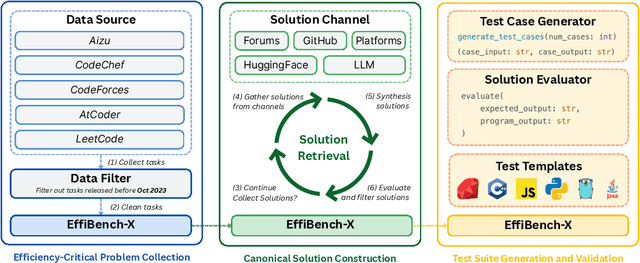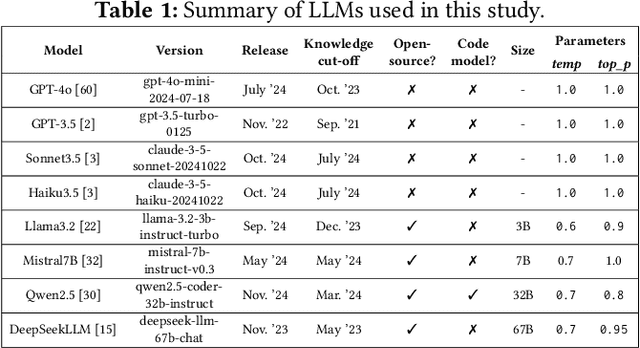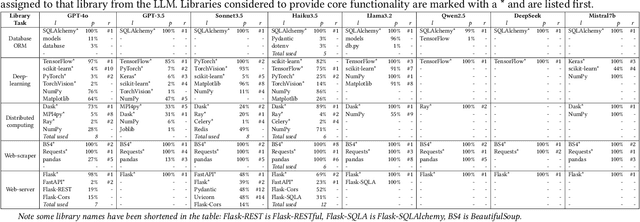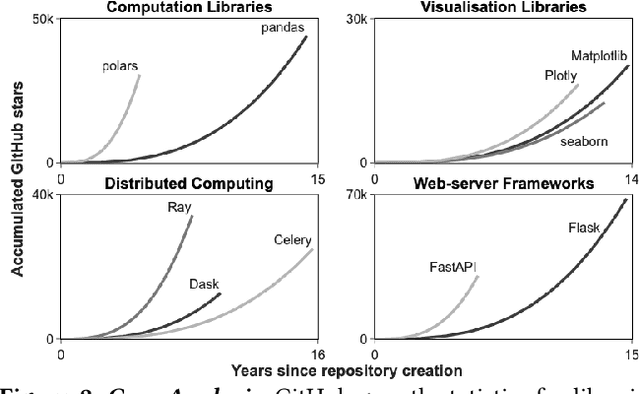Jie M. Zhang
University College London
Not All Code Is Equal: A Data-Centric Study of Code Complexity and LLM Reasoning
Jan 29, 2026Abstract:Large Language Models (LLMs) increasingly exhibit strong reasoning abilities, often attributed to their capacity to generate chain-of-thought-style intermediate reasoning. Recent work suggests that exposure to code can further enhance these skills, but existing studies largely treat code as a generic training signal, leaving open the question of which properties of code actually contribute to improved reasoning. To address this gap, we study the structural complexity of code, which captures control flow and compositional structure that may shape how models internalise multi-step reasoning during fine-tuning. We examine two complementary settings: solution-driven complexity, where complexity varies across multiple solutions to the same problem, and problem-driven complexity, where complexity reflects variation in the underlying tasks. Using cyclomatic complexity and logical lines of code to construct controlled fine-tuning datasets, we evaluate a range of open-weight LLMs on diverse reasoning benchmarks. Our findings show that although code can improve reasoning, structural properties strongly determine its usefulness. In 83% of experiments, restricting fine-tuning data to a specific structural complexity range outperforms training on structurally diverse code, pointing to a data-centric path for improving reasoning beyond scaling.
On the Impact of AGENTS.md Files on the Efficiency of AI Coding Agents
Jan 28, 2026Abstract:AI coding agents such as Codex and Claude Code are increasingly used to autonomously contribute to software repositories. However, little is known about how repository-level configuration artifacts affect operational efficiency of the agents. In this paper, we study the impact of AGENTS$.$md files on the runtime and token consumption of AI coding agents operating on GitHub pull requests. We analyze 10 repositories and 124 pull requests, executing agents under two conditions: with and without an AGENTS$.$md file. We measure wall-clock execution time and token usage during agent execution. Our results show that the presence of AGENTS$.$md is associated with a lower median runtime ($Δ28.64$%) and reduced output token consumption ($Δ16.58$%), while maintaining a comparable task completion behavior. Based on these results, we discuss immediate implications for the configuration and deployment of AI coding agents in practice, and outline a broader research agenda on the role of repository-level instructions in shaping the behavior, efficiency, and integration of AI coding agents in software development workflows.
Analyzing Message-Code Inconsistency in AI Coding Agent-Authored Pull Requests
Jan 08, 2026Abstract:Pull request (PR) descriptions generated by AI coding agents are the primary channel for communicating code changes to human reviewers. However, the alignment between these messages and the actual changes remains unexplored, raising concerns about the trustworthiness of AI agents. To fill this gap, we analyzed 23,247 agentic PRs across five agents using PR message-code inconsistency (PR-MCI). We contributed 974 manually annotated PRs, found 406 PRs (1.7%) exhibited high PR-MCI, and identified eight PR-MCI types, revealing that descriptions claiming unimplemented changes was the most common issue (45.4%). Statistical tests confirmed that high-MCI PRs had 51.7% lower acceptance rates (28.3% vs. 80.0%) and took 3.5x longer to merge (55.8 vs. 16.0 hours). Our findings suggest that unreliable PR descriptions undermine trust in AI agents, highlighting the need for PR-MCI verification mechanisms and improved PR generation to enable trustworthy human-AI collaboration.
Fairness Is Not Just Ethical: Performance Trade-Off via Data Correlation Tuning to Mitigate Bias in ML Software
Dec 19, 2025Abstract:Traditional software fairness research typically emphasizes ethical and social imperatives, neglecting that fairness fundamentally represents a core software quality issue arising directly from performance disparities across sensitive user groups. Recognizing fairness explicitly as a software quality dimension yields practical benefits beyond ethical considerations, notably improved predictive performance for unprivileged groups, enhanced out-of-distribution generalization, and increased geographic transferability in real-world deployments. Nevertheless, existing bias mitigation methods face a critical dilemma: while pre-processing methods offer broad applicability across model types, they generally fall short in effectiveness compared to post-processing techniques. To overcome this challenge, we propose Correlation Tuning (CoT), a novel pre-processing approach designed to mitigate bias by adjusting data correlations. Specifically, CoT introduces the Phi-coefficient, an intuitive correlation measure, to systematically quantify correlation between sensitive attributes and labels, and employs multi-objective optimization to address the proxy biases. Extensive evaluations demonstrate that CoT increases the true positive rate of unprivileged groups by an average of 17.5% and reduces three key bias metrics, including statistical parity difference (SPD), average odds difference (AOD), and equal opportunity difference (EOD), by more than 50% on average. CoT outperforms state-of-the-art methods by three and ten percentage points in single attribute and multiple attributes scenarios, respectively. We will publicly release our experimental results and source code to facilitate future research.
Nexus: Execution-Grounded Multi-Agent Test Oracle Synthesis
Oct 30, 2025Abstract:Test oracle generation in non-regression testing is a longstanding challenge in software engineering, where the goal is to produce oracles that can accurately determine whether a function under test (FUT) behaves as intended for a given input. In this paper, we introduce Nexus, a novel multi-agent framework to address this challenge. Nexus generates test oracles by leveraging a diverse set of specialized agents that synthesize test oracles through a structured process of deliberation, validation, and iterative self-refinement. During the deliberation phase, a panel of four specialist agents, each embodying a distinct testing philosophy, collaboratively critiques and refines an initial set of test oracles. Then, in the validation phase, Nexus generates a plausible candidate implementation of the FUT and executes the proposed oracles against it in a secure sandbox. For any oracle that fails this execution-based check, Nexus activates an automated selfrefinement loop, using the specific runtime error to debug and correct the oracle before re-validation. Our extensive evaluation on seven diverse benchmarks demonstrates that Nexus consistently and substantially outperforms state-of-theart baselines. For instance, Nexus improves the test-level oracle accuracy on the LiveCodeBench from 46.30% to 57.73% for GPT-4.1-Mini. The improved accuracy also significantly enhances downstream tasks: the bug detection rate of GPT4.1-Mini generated test oracles on HumanEval increases from 90.91% to 95.45% for Nexus compared to baselines, and the success rate of automated program repair improves from 35.23% to 69.32%.
Library Hallucinations in LLMs: Risk Analysis Grounded in Developer Queries
Sep 26, 2025



Abstract:Large language models (LLMs) are increasingly used to generate code, yet they continue to hallucinate, often inventing non-existent libraries. Such library hallucinations are not just benign errors: they can mislead developers, break builds, and expose systems to supply chain threats such as slopsquatting. Despite increasing awareness of these risks, little is known about how real-world prompt variations affect hallucination rates. Therefore, we present the first systematic study of how user-level prompt variations impact library hallucinations in LLM-generated code. We evaluate six diverse LLMs across two hallucination types: library name hallucinations (invalid imports) and library member hallucinations (invalid calls from valid libraries). We investigate how realistic user language extracted from developer forums and how user errors of varying degrees (one- or multi-character misspellings and completely fake names/members) affect LLM hallucination rates. Our findings reveal systemic vulnerabilities: one-character misspellings in library names trigger hallucinations in up to 26% of tasks, fake library names are accepted in up to 99% of tasks, and time-related prompts lead to hallucinations in up to 84% of tasks. Prompt engineering shows promise for mitigating hallucinations, but remains inconsistent and LLM-dependent. Our results underscore the fragility of LLMs to natural prompt variation and highlight the urgent need for safeguards against library-related hallucinations and their potential exploitation.
Large Language Models Miss the Multi-Agent Mark
May 27, 2025Abstract:Recent interest in Multi-Agent Systems of Large Language Models (MAS LLMs) has led to an increase in frameworks leveraging multiple LLMs to tackle complex tasks. However, much of this literature appropriates the terminology of MAS without engaging with its foundational principles. In this position paper, we highlight critical discrepancies between MAS theory and current MAS LLMs implementations, focusing on four key areas: the social aspect of agency, environment design, coordination and communication protocols, and measuring emergent behaviours. Our position is that many MAS LLMs lack multi-agent characteristics such as autonomy, social interaction, and structured environments, and often rely on oversimplified, LLM-centric architectures. The field may slow down and lose traction by revisiting problems the MAS literature has already addressed. Therefore, we systematically analyse this issue and outline associated research opportunities; we advocate for better integrating established MAS concepts and more precise terminology to avoid mischaracterisation and missed opportunities.
AMQA: An Adversarial Dataset for Benchmarking Bias of LLMs in Medicine and Healthcare
May 26, 2025Abstract:Large language models (LLMs) are reaching expert-level accuracy on medical diagnosis questions, yet their mistakes and the biases behind them pose life-critical risks. Bias linked to race, sex, and socioeconomic status is already well known, but a consistent and automatic testbed for measuring it is missing. To fill this gap, this paper presents AMQA -- an Adversarial Medical Question-Answering dataset -- built for automated, large-scale bias evaluation of LLMs in medical QA. AMQA includes 4,806 medical QA pairs sourced from the United States Medical Licensing Examination (USMLE) dataset, generated using a multi-agent framework to create diverse adversarial descriptions and question pairs. Using AMQA, we benchmark five representative LLMs and find surprisingly substantial disparities: even GPT-4.1, the least biased model tested, answers privileged-group questions over 10 percentage points more accurately than unprivileged ones. Compared with the existing benchmark CPV, AMQA reveals 15% larger accuracy gaps on average between privileged and unprivileged groups. Our dataset and code are publicly available at https://github.com/XY-Showing/AMQA to support reproducible research and advance trustworthy, bias-aware medical AI.
EffiBench-X: A Multi-Language Benchmark for Measuring Efficiency of LLM-Generated Code
May 19, 2025



Abstract:Existing code generation benchmarks primarily evaluate functional correctness, with limited focus on code efficiency and often restricted to a single language like Python. To address this gap, we introduce EffiBench-X, the first multi-language benchmark designed to measure the efficiency of LLM-generated code. EffiBench-X supports Python, C++, Java, JavaScript, Ruby, and Golang. It comprises competitive programming tasks with human-expert solutions as efficiency baselines. Evaluating state-of-the-art LLMs on EffiBench-X reveals that while models generate functionally correct code, they consistently underperform human experts in efficiency. Even the most efficient LLM-generated solutions (Qwen3-32B) achieve only around \textbf{62\%} of human efficiency on average, with significant language-specific variations. LLMs show better efficiency in Python, Ruby, and JavaScript than in Java, C++, and Golang. For instance, DeepSeek-R1's Python code is significantly more efficient than its Java code. These results highlight the critical need for research into LLM optimization techniques to improve code efficiency across diverse languages. The dataset and evaluation infrastructure are submitted and available at https://github.com/EffiBench/EffiBench-X.git and https://huggingface.co/datasets/EffiBench/effibench-x.
LLMs Love Python: A Study of LLMs' Bias for Programming Languages and Libraries
Mar 21, 2025



Abstract:Programming language and library choices are crucial to software reliability and security. Poor or inconsistent choices can lead to increased technical debt, security vulnerabilities, and even catastrophic failures in safety-critical systems. As Large Language Models (LLMs) play an increasing role in code generation, it is essential to understand how they make these decisions. However, little is known about their preferences when selecting programming languages and libraries for different coding tasks. To fill this gap, this study provides the first in-depth investigation into LLM preferences for programming languages and libraries used when generating code. We assess the preferences of eight diverse LLMs by prompting them to complete various coding tasks, including widely-studied benchmarks and the more practical task of generating the initial structural code for new projects (a crucial step that often determines a project's language or library choices). Our findings reveal that LLMs heavily favour Python when solving language-agnostic problems, using it in 90%-97% of cases for benchmark tasks. Even when generating initial project code where Python is not a suitable language, it remains the most-used language in 58% of instances. Moreover, LLMs contradict their own language recommendations in 83% of project initialisation tasks, raising concerns about their reliability in guiding language selection. Similar biases toward well-established libraries further create serious discoverability challenges for newer open-source projects. These results highlight the need to improve LLMs' adaptability to diverse programming contexts and to develop mechanisms for mitigating programming language and library bias.
 Add to Chrome
Add to Chrome Add to Firefox
Add to Firefox Add to Edge
Add to Edge